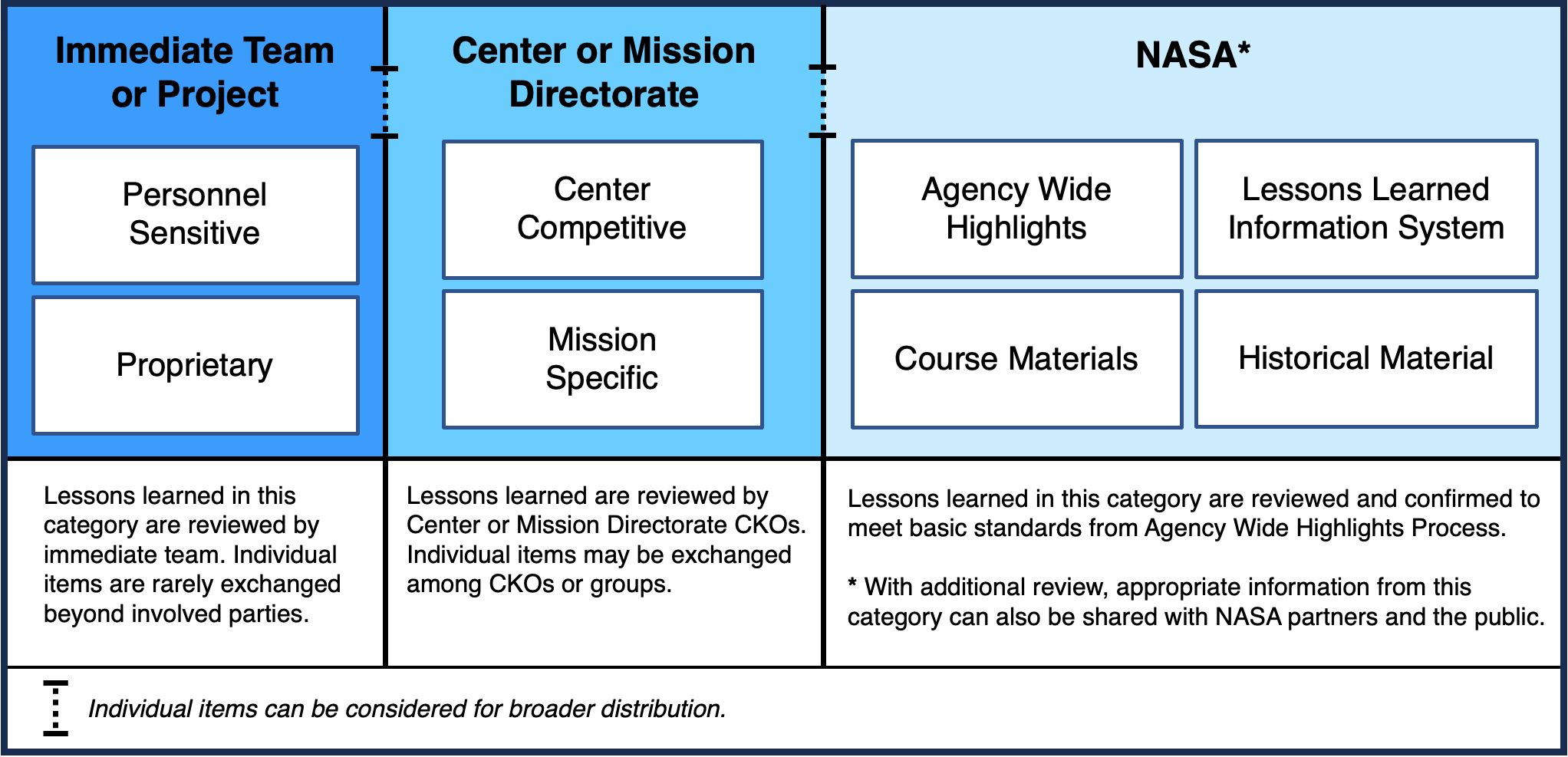Lessons Learned Lifecycle and Highlights
In order to reinforce the value of lessons learned (LL) and incentivize lessons learned sharing, NASA established criteria to identify and share lessons learned as agency-wide highlights. These criteria are applied by the NASA Lessons Learned Program Manager to evaluate submissions to the agency’s central lessons learned repository and determine items that should be shared and highlighted across the agency.
Lessons Learned Lifecycle
NASA identified four lessons learned lifecycle elements to provide clarity in understanding practices across the agency and help to identify areas where teams need greater support. Lessons may conceptually move across these elements in a non-linear fashion.
Collect
In the collect phase, lessons learned are identified by individuals or teams. Lessons learned may be collected in a variety of ways, including pause and learn sessions, individual write-ups, or formal or informal team discussions.
Record
In the record phase, lessons are documented and captured. NASA’s principal mechanism for collecting and sharing lessons learned from agency programs and projects is an online database called the Lessons Learned Information System (LLIS). Depending on their nature and scope, the lessons may also be recorded in local repositories, reports and publications, case studies and/or via video capture and other means.
Disseminate
In the disseminate phase, lessons that have been documented are shared with others who can benefit from this knowledge. LLIS publication is one mode of dissemination. Others include courses and webinars, presentations, briefings and other knowledge sharing forums, the Spotlight on Lessons Learned article series, community of practice discussions, and general communications notices.
Apply
In the apply phase, lessons are integrated in NASA practice. This is a crucial step to ensuring that lessons are infused throughout agency activities. Lessons are applied through a variety of methods, including updates to processes, checklists, handbooks, and formal policy.
Agency-Wide Highlight Criteria
- Submitter shall concur with submission to the NEN/LLIS.
Lessons submitted for agency highlights should be reviewed by submitters and their teams for dissemination to a wide audience. Note: lessons that are not approved for sharing with the public may be submitted to the NASA Engineering Network (NEN). These restricted lessons will not be eligible to be selected as agency highlights. - Lesson shall be appropriate for a broad audience, and any limitations based on NASA policy and Federal laws and regulations must be clearly marked.
Lessons should not contain management sensitive or competition sensitive information. Although Controlled Unclassified Information (CUI) is permissible in NEN, it must be clearly marked, and lessons containing CUI require additional reviews before selection as agency highlights. - Lesson elements shall have long-term validity and value to future work.
Lessons should encourage the appropriate actions and decisions for the agency, its teams, and its partners under similar circumstances in the foreseeable future. - Lessons shall focus on themes or elements with relevance to agency missions and/or agency operations with a direct impact on agency missions.
Though generally technically-focused, content may incorporate any topics related to the agency’s critical knowledge. Therefore, administrative and operational lessons pertaining to activities and mission support functions in relation to their engagement with core mission activities also are encouraged. - Lessons shall represent something new or a new perspective/refinement for previously documented lessons.
New entries should not repeat previously documented lessons unless there is a change in understanding to the prior lesson. Those lessons that offer actionable suggestions for addressing challenges in following existing procedures can be especially valuable.
Process for Lessons Learned Highlights
Using the lessons learned lifecycle elements, the following process is applied to identify and highlight lessons learned throughout NASA.
1. Collect
- Team identifies lesson of interest
- Team drafts initial notes for sharing (may either submit directly or request assistance for editing based on local practices)
2. Record
- Center, Program, or Mission team or LL steering committee reviews lesson
- Team submits lesson to local or agency-level repository (LLIS)
- Note: If not submitted to LLIS, highlight process stops here
3. Disseminate
- LL Program Manager (LL PM) publishes lesson in NEN or public-facing LLIS based on publication standards
- LL PM reviews lesson for agency highlight criteria
- If lesson meets all agency highlight criteria, LL PM flags for APPEL Knowledge Services (APPEL KS)
4. Highlight
- APPEL KS, NASA CKO community, and partners highlight lesson to appropriate audiences
- APPEL KS incorporates lesson in training and webinars
- Partner organizations and governance groups provide additional visibility to lesson as warranted
5. Apply
- Centers, Mission Directorates, formal governance groups, and SME communities assess lessons for changes to policy, process, or other practice
- Documentation and practices are updated as needed to integrate and infuse lessons learned
Lessons Learned Sharing Protocols
One advantage of NASA’s federated approach to knowledge management is that it supports lessons learned processes at different levels of the organization, allowing Center and Mission Directorate Chief Knowledge Officers to focus on capturing operational and technical lessons learned specific to local practitioners.
The chart below was developed by the CKO community in consultation with key stakeholders to describe the criteria used to determine which lessons are universally applicable and which are locally contingent or sensitive. Through these protocols, CKOs can maintain trust among their communities and support local and agency-wide processes for critical knowledge sharing.






